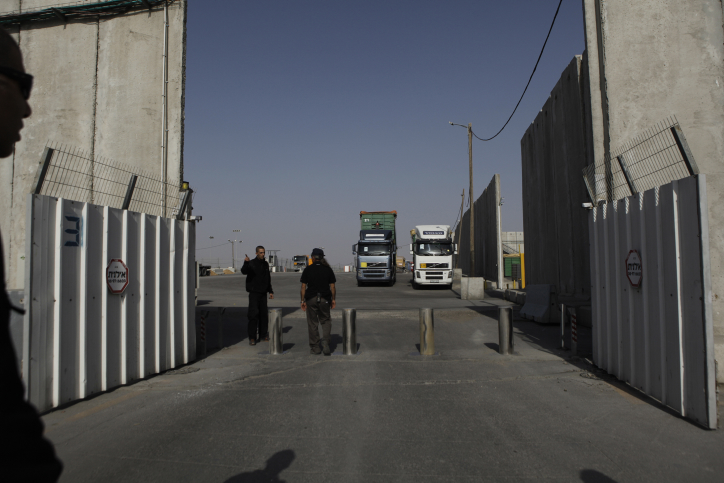
Ref: 09/2016
The Palestinian Center for Human Rights (PCHR) published a new report as part of the series of the monthly “Closure Reports” addressing the latest developments of the state of the Gaza Strip border crossings in February 2016. The report documents the impact of the ongoing Israel-imposed siege on Palestinian civilians, which affects their economic and social conditions. It also refutes Israel’s claims that it has eased the closure of the Gaza Strip for the ninth consecutive year. Furthermore, the report highlights that the continuing Israeli measures aim at the institutionalization of the closure and making the illegal restrictions imposed on the movement of persons and goods acceptable on the international level although they violate the international law, including the international humanitarian and human rights laws.
During the reporting period, the number of truckloads that were allowed to enter the Gaza Strip increased; however, no remarkable change was witnessed on the commercial level. Israeli forces allowed the entry of 19,224 truckloads, the majority of which were foodstuffs and consumables; an average of 663 truckload daily. Restrictions were also imposed on the entry of a number of basic goods, especially materials needed for Gaza reconstruction, infrastructure projects and materials for manufacturing and production. Moreover, many obstacles were imposed on the entry of imports, including the frequent closure of the only commercial crossing in the Gaza Strip, Karm Abu Salem (Kerem Shalom); the crossing was closed for 8 days (27.5% of the total period).
Concerning the exports, Israeli forces continued to impose a ban on the Gaza Strip exports to the West Bank, Israel and abroad with the exception of limited quantities. During the reporting period, 190 truckloads were allowed for exportation to the West Bank, including 181 truckloads of agricultural products (strawberries, tomatoes, potatoes, sweet potatoes, cucumbers, cabbages, dates, cauliflowers, lemons, sweet and hot peppers, garlic, eggplants, zucchinis and mints), 6 truckloads of fish, a truckload of furniture, a truckload of cloths and a truckload of scrap. The rate of the Gaza Strip exports for February constitutes 4.3% of the exports before June 2007.
As for the movement of persons, the Gaza Strip population has been denied their right to the freedom of movement and has been suffering due to obstacles imposed on their movement at all border crossings that connect the Strip with the West Bank and Israel.
Moreover, during the reporting period, Israeli forces imposed restrictions on the movement of Gaza population at Beit Hanoun (Erez) crossing, the only crossing for the movement of persons to the West Bank, including Jerusalem, and/or Israel. As a result, 2 million people have been denied their right to the freedom of movement. A limited number of Palestinians were allowed to travel via the crossing: 1,299 patients, 1,224 patient companions, 8,273 businesspeople, 2,081 persons for personal needs, 755 workers of international humanitarian organizations, 256 persons travelling via al-Karama crossing, 252 persons to visit their relatives in Israeli prisons and 728 elderly people to perform prayers in al-Aqsa Mosque under very complicated procedures.
During the reporting period, Rafah International Crossing Point was closed as a result of the Egyptian internal situation and the deteriorating security situation in north Sinai. In an exception, the crossing opened for 3 days only for limited cases in which, 2,439 persons were allowed to leave the Gaza Strip, 1,122 persons returned and 334 were returned by the Egyptian authorities. This unveiled the reality of the situation in the Gaza Strip under the policy of collective punishment and the Israeli closure imposed over all border crossings. The number of Palestinians, who registered for traveling via the crossing and are waiting for their turn to travel, was over 25,000, including hundreds of patients, university students and holders of residence visas in countries abroad, according to the Ministry of Interior in Gaza.
In the report’s recommendations, PCHR called upon the international community, particularly the High Contracting Parties to the Fourth Geneva Convention Relative to the Protection of Civilian Persons in Time of War, to immediately intervene to compel Israeli authorities to open the Gaza Strip crossings and put an end to the grave deterioration of humanitarian situation in the Gaza Strip.
… [Trackback]
[…] Read More Information here on that Topic: pchrgaza.org/pchr-publishes-new-report-in-february-2016-as-part-of-the-closure-reports-series/ […]